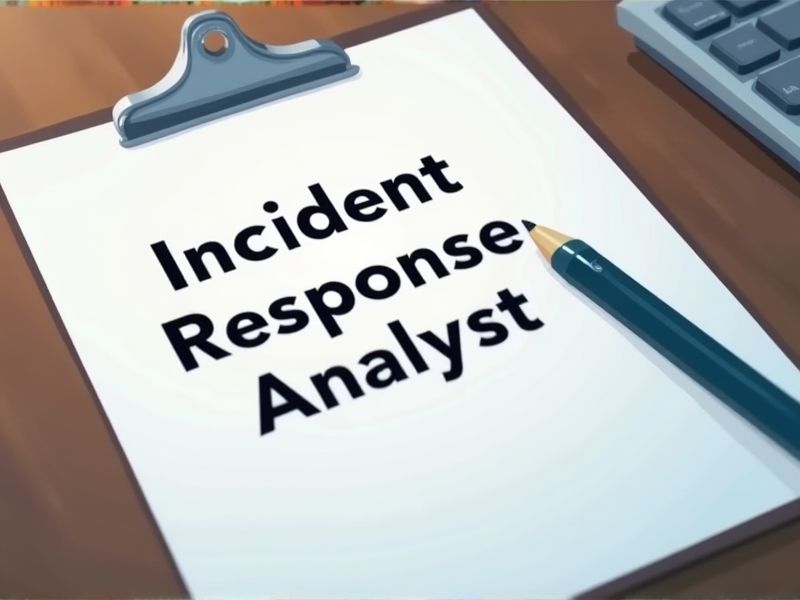
Incident Response Analysts play a crucial role in safeguarding an organization's data and systems, meaning their expertise directly impacts the effectiveness of cybersecurity measures. Certain certifications, such as CISSP and CEH, ensure that analysts possess comprehensive knowledge of threat detection and mitigation strategies. The complexity and evolving nature of cyber threats demand that these professionals stay updated with industry standards and best practices. Key certifications for an Incident Response Analyst include those that validate proficiency in these areas.
GIAC Certified Incident Handler (GCIH)
Organizations face increasing cybersecurity threats, leading to a rising demand for certified professionals like GIAC Certified Incident Handlers (GCIH). The certification ensures incident response analysts can efficiently detect, respond to, and manage security incidents. GCIH holders possess the necessary skills to identify network vulnerabilities and execute effective countermeasures. Employing GCIH-certified professionals can enhance an organization's resilience against cyber threats and improve its overall security posture.
Certified Information Systems Security Professional (CISSP)
Organizations increasingly face complex cyber threats; Incident Response Analysts with a CISSP certification possess the necessary breadth of knowledge to address these challenges. The certification ensures an understanding of various security domains, which contributes to more effective identification and response to incidents. Holding a CISSP enhances credibility and trustworthiness, essential for dealing with sensitive security breaches. The credential also often meets regulatory requirements or industry standards, making it a valuable asset in maintaining organizational compliance.
Certified Ethical Hacker (CEH)
Certified Ethical Hacker (CEH) certification equips an Incident Response Analyst with knowledge of potential security vulnerabilities, essential for identifying weaknesses in a system. This understanding aids in efficiently developing strategies to mitigate security breaches. It ensures the analyst can anticipate hacker strategies, allowing preemptive defensive measures. CEH training contributes to thorough incident analysis, enabling a comprehensive response to security incidents.
GIAC Certified Forensic Analyst (GCFA)
Incident response analysts face increasingly complex cyber threats, necessitating specialized skills, which a GIAC Certified Forensic Analyst (GCFA) credential provides, ensuring effective threat management. The certification equips professionals with advanced techniques in digital forensics, enabling them to accurately reconstruct events, crucial for understanding incidents. Organizations benefit by having certified analysts who can not only respond to breaches efficiently but also enhance overall security posture. Possessing a GCFA certification demonstrates a commitment to maintaining industry standards and staying abreast of evolving cyber threat landscapes.
CompTIA Cybersecurity Analyst (CySA+)
Employing a CompTIA Cybersecurity Analyst (CySA+) certified professional equips an organization with the ability to proactively address and mitigate security threats, enhancing its incident response capabilities. The CySA+ certification ensures the analyst possesses essential skills in threat detection techniques and vulnerability management, which are crucial for identifying potential incidents before they escalate. Furthermore, the comprehensive knowledge gained through CySA+ enables the analyst to effectively interpret data and implement response strategies to minimize the impact of security breaches. The continuous learning framework embedded in CySA+ prepares analysts to adapt to evolving cyber threats, ensuring ongoing robust security postures.
Certified Information Security Manager (CISM)
Organizations face increasing cybersecurity threats, so they require Incident Response Analysts to manage and respond to these incidents effectively. A Certified Information Security Manager (CISM) equips professionals with a comprehensive understanding of information security management, crucial for developing incident response plans. This certification ensures they possess the knowledge to align security practices with business goals, enhancing overall incident response strategies. Incident response analysts with CISM can effectively lead response teams and communicate with stakeholders, ensuring timely mitigation of security events.
Offensive Security Certified Professional (OSCP)
Holding the Offensive Security Certified Professional (OSCP) certification equips an Incident Response Analyst with hands-on penetration testing skills essential for identifying root causes of security breaches. It enhances an analyst's ability to understand attacker methodologies, which is crucial in devising effective countermeasures. A deeper knowledge of security vulnerabilities aids in developing more robust defense strategies during incident response efforts. Having the OSCP credential often increases credibility and trust among peers and management, potentially influencing career advancement opportunities.
Certified Computer Forensics Examiner (CCFE)
A Certified Computer Forensics Examiner (CCFE) ensures a thorough and reliable investigation when a security breach occurs. Possessing specialized skills in data recovery and analysis, they enhance the ability of an Incident Response Analyst to pinpoint the cause and extent of security incidents. Their expertise in preserving digital evidence is critical for legal proceedings or further investigation. CCFE credential holders contribute to more effective strategies in mitigating future threats by providing detailed insights into the incident.
GIAC Network Forensic Analyst (GNFA)
Incident Response Analysts benefit from the GIAC Network Forensic Analyst (GNFA) certification because it equips them with the skills to analyze network traffic and identify intrusions effectively. This ability to scrutinize data packets aids in pinpointing the source and method of an attack, reducing response time. Network forensic skills also enhance the capacity to collect and preserve evidence vital for investigations and compliance. Armed with GNFA expertise, analysts are better prepared to design strategies that mitigate future risks.
EC-Council Certified Incident Handler (ECIH)
The EC-Council Certified Incident Handler (ECIH) certification equips incident response analysts with essential skills to methodically manage and mitigate security breaches. It provides a structured framework, ensuring analysts are well-prepared to handle and document incidents effectively, reducing potential damage. Businesses require certified professionals to safeguard sensitive data and maintain operational continuity in the event of an attack. This certification demonstrates a standardized level of competence, enhancing the credibility and trustworthiness of incident response teams.
Summary
As an Incident Response Analyst, acquiring certifications can enhance your skill set and industry knowledge. This targeted advancement often leads to greater recognition within your organization. With increased expertise, you are more likely to implement effective security measures, reducing the impact of cyber threats. Certification can also open up opportunities for career growth and potentially higher compensation.
